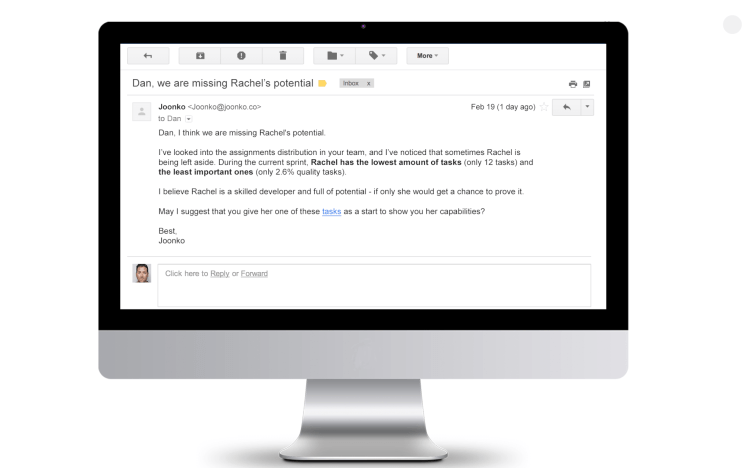Want smarter insights in your inbox? Sign up for our weekly newsletters to get only what matters to enterprise AI, data, and security leaders. Subscribe Now
We all have biases, whether they are conscious or unconscious. But when these biases start impacting our decisions in the workplace, it becomes a problem. Joonko, an Atlanta-based startup that is relocating to San Francisco, wants to change all that. The startup announced today that it is launching a second version of its software, specifically for managers who want to ensure greater inclusion within their teams.
“We got approached by sales managers from companies we aren’t currently working with who want to use our software for their teams,” said cofounder and chief executive Ilit Raz in an interview with VentureBeat.
Founded in 2016, the Techstars Atlanta graduate launched an artificial intelligence-powered software last year that plugs into companies’ existing platforms, such as Atlassian Jira, Salesforce, and Workday. The idea, according to Raz, is to rifle through a given company’s existing data in order to suggest real-time corrective action that can reduce discrimination at work.
“One interesting thing that we see in the industry is what people think when women return from maternity leave,” said Raz. “They often anticipate their performance will be lower, when in fact research shows that they are at their highest productivity.”
Pricing is still relatively low, with tiers for companies and individuals. For companies, it ranges between $25 and $35 per job, to ensure diversity in recruiting. For team inclusion, it ranges between $3 to $6 per employee per month. For individual use and coaching, the price range is $3 to $9 a month.
When Joonko does sell to a company, Raz explained that no extra work is required on the company’s end. “Basically, we are connecting to platforms that the company is already using and analyzing data that already exists,” she said. So far, there are 11 companies that are testing the software in pilot stage, but the startup declined to identify them. “Companies know that there is a problem but can’t really put their fingers on what that problem is.”
As an example, Joonko will look at employee records to determine whether they have been working productively, and if so, whether they are given the right tasks and offered the right opportunities. The startup also helps with hiring processes.
https://www.youtube.com/watch?v=Zefg8vMjwW8&feature=youtu.be
It would have been interesting to see Joonko collaborate with neuroscientists, psychoanalysts, or cognitive behavioralists to try and understand the deeper layers and processes of the unconscious. However, like many startups today, Joonko is betting on the sole power of AI.
The company has raised a total of $300,000 in seed funding — $120,000 from Techstars and $180,000 from angel investors. It has six employees today (three full-time and three part-time). For now, the team is focusing on gender and minorities, but it intends to expand to include other profiles that are prone to discrimination, including factors like age and religion.
That last is particularly interesting, as Raz, who is Israeli, has her research and development base in Israel. When asked whether her software could help reduce discrimination between Jews and Muslims at work, she answered very honestly: “Unfortunately, I don’t think Israel is as open-minded as the U.S. about these issues. But hopefully, they will start using our software and set an example.”
Diversity and inclusion have been hot topics for a while now in Silicon Valley. But since the Ellen Pao case in 2015, these issues have been catapulted to the top of tech companies’ priority lists, with Google for Entrepreneurs powering an annual Tech for Inclusion Summit, for example. It’s getting harder and harder for companies to ignore claims about lack of diversity and inclusion.
Last year, Intel announced that 43.4 percent of its new hires in the first half of 2016 were either women or underrepresented minorities. In September, Salesforce announced that it was hiring its first chief equality officer, former Microsoft executive Tony Prophet. Disclosing diversity reports is a must now.
So tech leaders are consciously trying to remove any form of unconscious bias. But with a new president being sworn into office this Friday, things might not evolve so smoothly, especially when some tech leaders have decided to side with the new administration. Maybe President-elect Donald Trump should look into a Joonko subscription for the White House?


